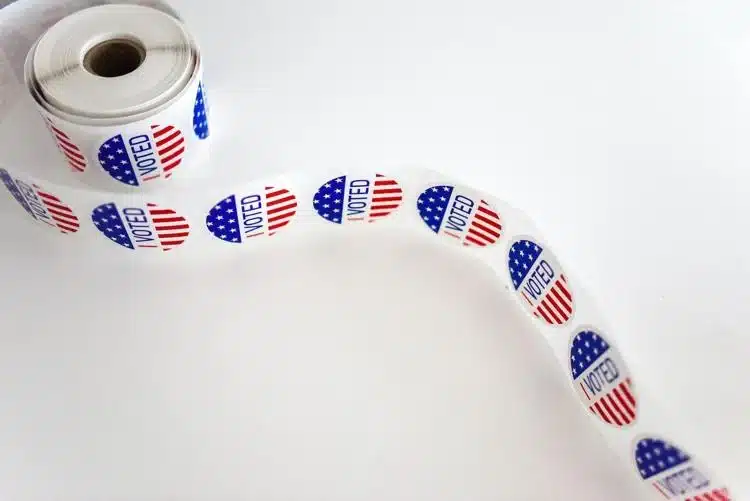
By Leslie Bonilla Muñiz
Indiana Capital Chronicle
July 4, 2022
Indiana plans to pay a homegrown election equipment company more than $12 million to retrofit thousands of electronic-only voting machines to boost election security and voter confidence despite doubts from some experts on the move’s effectiveness.
Indianapolis-based MicroVote will receive about $12.3 million for about 5,030 printers in 45 Indiana counties using electronic-only setups to count votes, according to the Secretary of State’s office. In March, state lawmakers handed the office a July 2024 deadline – five years shorter than the previous December 2029 deadline.
That’ll be in time for the 2024 presidential elections.
“[The printers] will allow us to better do audits. … And it’ll be easier to do recounts, because we have a paper record now,” said Secretary of State Spokesman Allen Carter.
MicroVote’s paperless Infinity Voting Panel and its add-on printers passed Indiana’s Voting System Technical Oversight Program security testing in a 2020 report.
But researchers have found significant software vulnerabilities in electronic-only voting machines in reports going back two decades, according to a 2018 literature review from the Air Force Institute of Technology.
Those weaknesses have been on full display at cybersecurity conference DefCon, at which hackers continue to breach dozens of machines, some within minutes or wirelessly.
And because there’s no back-up, it’s difficult to pick up on errors. A 2019 report by University of South Carolina Professor Duncan Buell found the state’s electronic-only machines incorrectly logged hundreds of votes. The state’s election commission included them in its official results.
A slim majority of Indiana voters – 54% – voted on direct-recording electronic devices in 2020, according to a white paper from Indiana University’s Public Policy Institute. That’s significantly higher than the 14% of voters who use electronic-only machines nationwide.
Indiana hopes to drop that number to zero.
Through House Bill 1116, Indiana legislators chopped several years off an older deadline, giving the Secretary of State’s office until July 1, 2024 to get the job done.
Forty-seven counties already use the add-on printers or have voting machines with some paper component, according to the Secretary of State’s office.
Indiana plans to close the gap by retrofitting its remaining counties’ electronic-only machines with printers that experts call voter-verifiable paper audit trails. Counties won’t be buying any equipment themselves, according to the office.
MicroVote is the only one of four Hoosier election equipment manufacturers with products impacted by the mandate, Carter said, so Indiana’s buying the add-ons from the same company.
“It’s really only one piece of equipment. There really wasn’t a bidding process, because there wasn’t multiple different types of VVPATs that we could utilize from different vendors,” said Jay Phelps, the office’s director of elections modernization. “It was just literally, here’s the option and this is how we move forward.”
MicroVote didn’t return multiple requests for comment.
The contract and purchasing order are in the works. Phelps said MicroVote had assured the office that the equipment would be in by the July 2024 deadline and operational by the elections later that fall, but that the timeline would depend on the supply chain.
The plan received mixed reviews from voting rights advocates and election experts.
“The suspicious part of me … says, ‘Well, that was a windfall for MicroVote, wasn’t it?’” said Barbara Tully, who leads nonprofit Indiana Vote by Mail.
She suggested that Indiana instead invest in paper voting and ballot-marking devices, and that it legalize ballot drop-boxes.
In contrast, election watchdog Common Cause Indiana “chose not to oppose” HB 1116 despite the “clunky, expensive retrofit” it requires, said Executive Director Julia Vaughn.
MicroVote – with its contracts, customer loyalty and influence – was one factor. But so was the rise in election result skepticism.
“Given the tenor of the national debate, I think it’s important to fill up any holes you can in terms of people’s confidence in the election,” Vaughn said.
“If I had a flat tire and my only option was to patch it rather than have somebody come out and put a new tire on, I’d rather have that option than just sit on the side of the road,” she added. “This tire is better than trying to drive on a flat.”
But, Downs said, “I have come around to the idea that VVPAT is beneficial because it gives comfort to voters, and [it’s] beneficial because it allows election administrators another mechanism for auditing results.”
Election administrators can check against the backup paper trail instead of simply running the electronic-only machines again. Downs said administrators can use the printed copies to more easily conduct audits and track error rates over time.
But the perception of security is as important as security itself.
“When you’re asking for a recount, you’re technically asking for two things, potentially. One is a legitimate recount,” he said. “But the other thing that usually goes along with a request for a recount is a challenge of the election. In other words, there was a flaw significant enough in the administration of the election that results should not be trusted. Is this the thing that will make people trust?”
Indiana Capital Chronicle is part of States Newsroom, a network of news bureaus supported by grants and a coalition of donors as a 501c(3) public charity. Indiana Capital Chronicle maintains editorial independence. Contact Editor Niki Kelly for questions: [email protected].